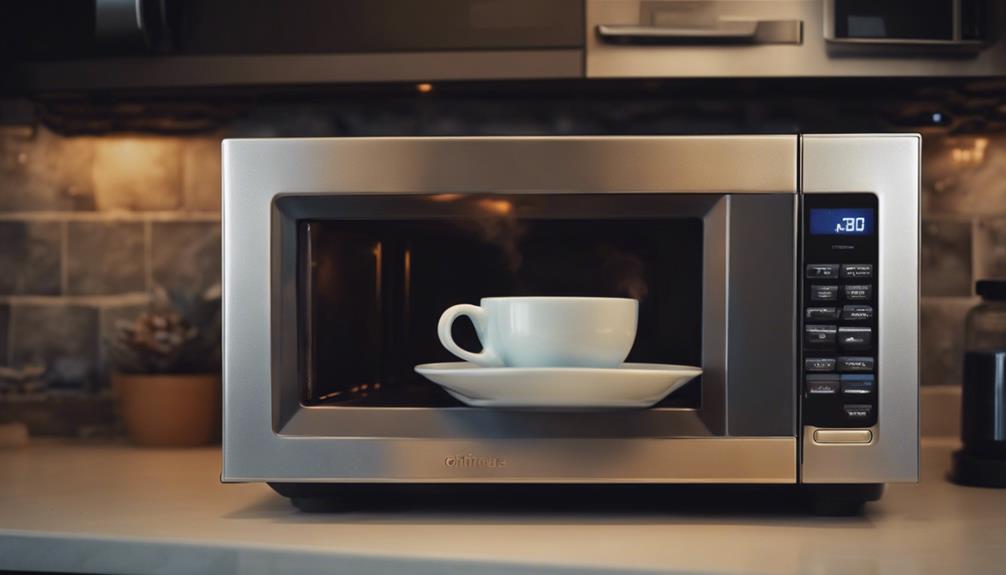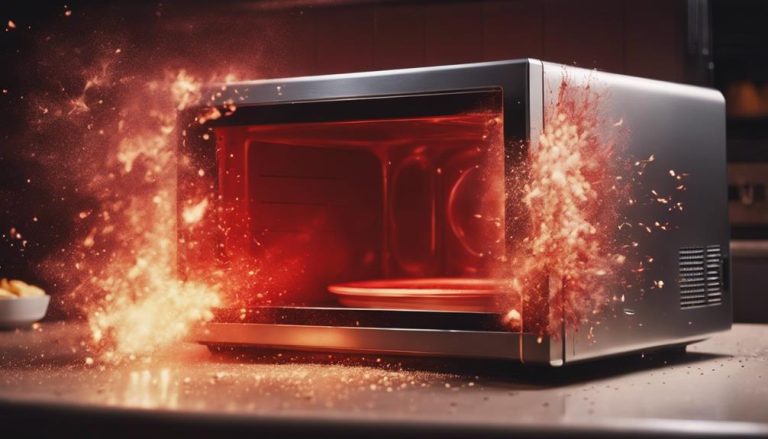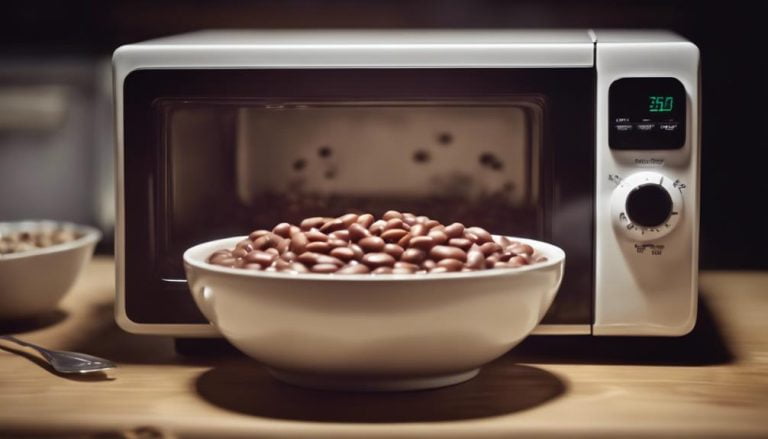Can You Microwave Coffee
No, it is not recommended to microwave coffee.
While it may provide a quick way to warm up your drink, microwaving coffee can alter its taste and aroma.
The impact of reheating coffee in the microwave is a topic of debate among coffee enthusiasts.
Therefore, it is best to consider alternative methods to warm up your coffee that won't affect its flavor.
Key Takeaways
- Microwaving coffee alters flavor due to chemical changes.
- Reheating in short intervals minimizes flavor impact.
- Understanding heat effects is crucial for maintaining desired flavors.
- Bitterness intensifies and aromas diminish when coffee is reheated.
Safety of Microwaving Coffee
The safety of microwaving coffee is frequently questioned due to concerns about its impact on flavor rather than any inherent health risks. While reheating coffee in the microwave is generally safe, it can lead to alterations in taste due to chemical changes that occur.
One notable effect is the potential intensification of bitterness as bitter compounds are released during reheating. To maintain the quality of coffee when using a microwave, it is advisable to do so in moderation. By reheating in short intervals and stirring in between, one can minimize flavor changes and ensure a more consistent taste profile.
Impact on Coffee Flavor
Microwaving coffee can significantly impact its flavor profile, intensifying bitterness and altering delicate aromas due to the breakdown of compounds in the beans.
Heat exposure during reheating can lead to changes in the taste of coffee by diminishing acidity and sweetness, affecting its overall perception.
Additionally, the use of closed storage containers and chemical reactions further contribute to the flavor transformation when coffee is reheated in the microwave.
Flavor Changes When Microwaved
Reheating coffee in a microwave can significantly alter its flavor profile, impacting its taste and aroma. When coffee is microwaved, the following changes occur:
- Intensified Bitterness: The breakdown of chlorogenic acids in coffee beans leads to a more bitter taste.
- Loss of Volatile Compounds: Delicate aromas are destroyed during the reheating process, affecting the overall flavor.
- Diminished Acidity and Sweetness: Cooling and reheating processes reduce acidity and sweetness, enhancing the perception of bitterness.
- Influence of Storage and Chemical Reactions: Closed storage containers and chemical reactions contribute to flavor changes, negatively impacting the taste of microwaved coffee.
Heat Affects Coffee Taste
Frequent exposure to heat can significantly modify the flavor profile of coffee, altering its taste and aroma. When coffee is reheated, whether on a stovetop or in a microwave, the heat can lead to flavor changes.
Reheating coffee can intensify its bitterness due to the breakdown of chlorogenic acids, while also impacting its acidity and sweetness. The process of reheating slowly diminishes the volatile compounds responsible for delicate aromas in coffee, resulting in a less flavorful cup.
Additionally, chemical reactions that occur during reheating, especially in a microwave, can further alter the coffee's composition. Understanding how heat affects coffee taste is crucial for maintaining the desired flavors and aromas in each cup.
Microwaving Alters Coffee Aroma
Coffee's delicate aromas and nuanced flavors face significant alteration when exposed to the intense heat of microwaving, impacting the overall flavor profile of the beverage.
- Microwaving disrupts volatile compounds responsible for coffee's aroma.
- The intense heat can lead to the loss of subtle flavors in coffee.
- Alteration of the chemical composition during microwaving affects the flavor profile.
- Accelerated degradation of volatile compounds in the microwave impacts the aroma of reheated coffee.
Influence on Coffee Aroma
Microwaving coffee can significantly impact its aroma by causing the breakdown of delicate volatile compounds responsible for its scent profile. The fragile aromas in coffee are sensitive to the heat and prolonged exposure in a microwave, leading to changes in aroma.
This alteration can be attributed to the chemical reactions that occur within the closed environment of the microwave, affecting the aromatic qualities of the beverage. As coffee cools and is reheated, the perception of aroma is also affected, with the volatile compounds crucial for the aroma being compromised.
Therefore, microwaving coffee may not be the best method to reheat it if preserving its original aromatic profile is a priority.
Bitterness in Reheated Coffee

Reheated coffee often develops a heightened bitterness, which can be attributed to the breakdown of chlorogenic acids and the alteration of aromatic compounds during the reheating process.
Understanding the factors contributing to this bitterness can help coffee enthusiasts take steps to minimize its impact and enjoy a more balanced flavor profile in their reheated brews.
Reheated Coffee Taste
Upon reheating, the flavor of coffee can become notably more bitter due to the intensified release of bitter compounds and the breakdown of chlorogenic acids. The reheating process alters the delicate aromas of freshly brewed coffee, impacting its overall taste.
Here are some key points to consider:
- Chemical reactions: Reheating coffee leads to chemical changes that enhance bitterness.
- Acidity and sweetness: Diminish during reheating, making the coffee taste more bitter.
- Storage: Closed containers can affect the flavor profile of reheated coffee.
- Temperature: Reheating at low temperatures can still intensify bitterness due to the breakdown of compounds.
Tips to Reduce Bitterness
To enhance the taste of reheated coffee and reduce bitterness, incorporating simple adjustments like adding a pinch of salt or sweetening with sugar can effectively counteract the intensified bitter notes resulting from the reheating process. Additionally, mixing in a small amount of butter or coconut oil can help mellow out the bitterness in reheated coffee.
Opting for high-quality coffee with balanced flavors can also aid in minimizing bitterness when reheating. Experimenting with different brewing methods or coffee types is another strategy to explore for a less bitter experience when reheating coffee.
Reheating Specialty Coffees
When considering the reheating of specialty coffees, it is essential to be mindful of the potential impact on their delicate flavors and aromas.
- Reheating specialty coffees can intensify bitterness due to the breakdown of chlorogenic acids.
- Specialty coffees with delicate flavors and aromas may lose their complexity when reheated.
- High-scoring specialty coffees, above 86 points, may experience flavor changes when reheated.
- Reheating specialty coffees can lead to the destruction of volatile compounds, affecting aroma.
It is crucial to understand that different reheating techniques can impact the quality and flavor of specialty coffees differently. Microwave reheating, in particular, can alter the taste and aroma of specialty coffees, so it is recommended to explore alternative reheating methods for preserving the unique characteristics of these coffees.
Alternative Coffee Reheating Methods

Exploring alternative methods for reheating coffee beyond the conventional microwave or stove can enhance the retention of its flavor and aroma profiles.
Using an espresso machine's steam wand is a quick alternative to reheat coffee without a microwave.
Another option is to add hot water or milk to room temperature coffee, bringing it to a warmer temperature without a microwave.
It's important to note that significant amounts of hot water or milk may be necessary to effectively reheat cold coffee using these methods.
Tips for Microwaving Coffee
Microwaving coffee can significantly impact its flavor profile by accelerating chemical changes and intensifying bitterness due to the breakdown of chlorogenic acids in the beans. When reheating coffee in the microwave, consider the following tips to preserve its taste:
- Use short intervals: Heat coffee in short bursts to prevent overheating and preserve flavor.
- Stir well: Stirring the coffee between intervals helps distribute the heat evenly, avoiding hot spots.
- Cover the container: Covering the coffee while microwaving helps retain moisture and prevent flavor loss.
- Add milk or cream: Incorporating dairy products can help balance out the bitterness and improve the overall taste of reheated coffee.
Frequently Asked Questions
Can Microwaving Coffee Cause Any Health Risks?
Microwaving coffee at high temperatures may lead to taste changes, potential toxins, and health concerns due to chemical reactions. Overheating risks can result in a bitter aftertaste, altering coffee aroma. Microwave safety practices are crucial.
Does Microwaving Coffee Affect the Caffeine Content?
Caffeine retention in reheated coffee after microwaving is consistent due to stable heating times and temperatures. Taste changes occur primarily due to aroma preservation and coffee strength, maintaining the flavor profile and quality of the coffee.
Will Microwaving Coffee Change the Color of the Coffee?
Microwaving coffee may lead to minimal color changes, primarily due to flavor concentration rather than a significant alteration. The process should focus on preserving flavor, controlling temperature, and retaining aroma for optimal coffee quality.
Can Microwaving Coffee in Certain Types of Mugs or Cups Be Harmful?
Microwaving coffee in improper mugs or cups can be harmful due to potential damage to the vessel, uneven heat distribution affecting flavor, and safety concerns. Use microwave-safe ceramic or glass containers designed for beverage heating to maintain coffee quality.
How Does Microwaving Coffee Affect the Acidity Levels?
Microwaving coffee alters its acidity levels by disrupting the delicate balance of chlorogenic acids. This process intensifies the acidic taste, affecting flavor changes and taste preferences. Proper microwaving techniques can help control temperature, preserving coffee quality and aroma.
Conclusion
In conclusion, the convenience of microwaving coffee must be weighed against the negative impact it has on flavor and aroma. While it may quickly warm up your coffee, microwaving disrupts the chemical composition of the beverage, leading to a more bitter taste.
For a smoother and more aromatic coffee experience, it is advisable to avoid reheating coffee in the microwave and opt for freshly brewed coffee instead. Consider the trade-offs between convenience and quality when deciding how to reheat your coffee.






